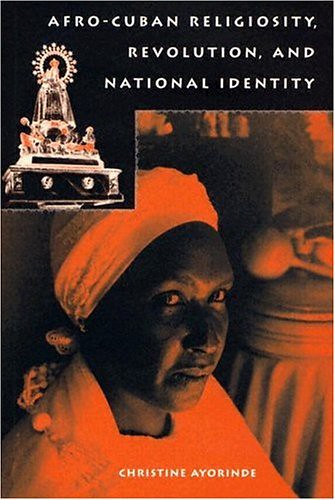 Here is a brief review
Here is a brief review of the book Afro-Cuban Religiosity, Revolution, And National Identity by Christine Ayorinde.
The review begins with the remark:
"Ayorinde breaks new ground in her important discussion of the evolution of revolutionary policy toward religion in general, and Afro-Cuban religious practice in particular. . . . Although she is careful not to overstate her case, the conclusion one can draw from her book is that the nation Fidel Castro declared to be 'Afro-Latin' in 1975 is in the process of becoming the world's first socialist state acknowledging (however tacitly) a congeries of African-derived religious forms as its 'national' religion."--Stephan Palmié, University of Chicago
For a long time I've been thinking about the relationship between
Santeria and Islam. There are interesting similarities and contrasts. Although on a personal level, the bulk of my family members are either Protestant (like my parents) or Catholic or non-religious, from an "ethnic" perspective, one could certainly make a case that Santeria is the religion of "my (Cuban) people" (which is basically the point of the above passage). The descendants of African slaves in the New World especially South of the Border were able to substantially hold onto the faith and traditions of the ancestors by hiding their practices within a Catholic matrix. Outwardly they showed devotion to Saint Barbara, but inwardly they would think "Chango". Outwardly they would pray to St. Peter, but in their hearts they would say "Ogun". Some might dismiss Santeria as idolatry and superstition, but from another perspective it is an admirable exercise in creative resistance to oppression.
If ethnicity were a primary consideration in choosing a religion, then it is likely I would have become a practitioner of Santeria (which is becoming more dominant and widespread in my parent's homeland) instead of Islam. I chose Islam, in part, because it was a more universal religion, a more human religion. As one author put it, Islam is about the encounter between God as such, and man as such. Nevertheless, there are still ways in which Islam has a certain strong organic relationship with the
Latino and
Black [1] [2] experience. (Also check my links section for sites which deal with Black or Hispanic/Latino Muslims)
Another interesting question for me is to think about how Muslims ought to view Santeria. In my opinion, one of the real strengths of Islam is it's capacity to come to terms with other religions and tolerate them, without collapsing into a wishy-washy relativism. Muslims can respect the divine origins of Christianity, Judaism, and other revealed religions while at the same time encouraging a commitment to truth and justice.
As the Quran says:
Surely those who believe, and those who are Jews, and the Christians, and the Sabians, whoever believes in Allah and the Last day and does good, they shall have their reward from their Lord, and there is no fear for them, nor shall they grieve. [2.62]
And over the centuries, as Muslims encountered other faiths, arguments were made that Buddhists, Hindus, Zoroastrians, etc. could also be recognized as people of the book, or at least those who "believe in Allah and the Last day and do good".
In the case of Santeria where do we stand? Although sometimes thought of as polytheistic because of the belief in different
orishas or spirits, Santeria actually does believe in a single creator God (named Oludumare). So in Islamic terms it is at least conceivable that the different orishas represent different names or aspects of the one God, or more likely, the orishas, who are generally not thought of as perfect or absolute, can correspond to angels or jinn. Another possibility is that some of the orishas were actually human prophets who (like Jesus) became "deified" once their ministries ended. In fact, this likely in the case of
Chango who was an ancient Yoruba king.
Do practitioners of Santeria have a book? The principles of Santeria are generally transmitted by an oral tradition (and so was the Quran originally), but
there is a collection of oral texts, in particular there are a set of texts related to
Ifa divination (which in certain respects is similar to the I Ching, discussed in an
earlier blog entry)
Santeria also provides its practitioners with an ethical/moral framework as well. In this regard, the 11 Commandments attriibuted to Oludumare are sometimes mentioned:
1. You will not steal
2. You will not kill, except in self-defense and for your sustenance
3. You will not eat human flesh
4. You will live in peace among yourselves
5. You will not covet your neighbor's properties
6. You will not curse my name
7. You will honor your father and mother
8. You will not ask more than I can give you and you will be content with your fate
9. You will neither fear death nor take your own life
10. You will teach my commandments to your children
11. You will respect and obey my laws
All in all, I would just like to suggest that Santeria, like Christianity and Judaism, can be thought of as a religion of Ahl al-Kitab (People of the Book) with a divine origin (however distant or however much it may have changed since its beginnings). But of course, Allahu alim (God knows best).



